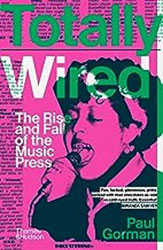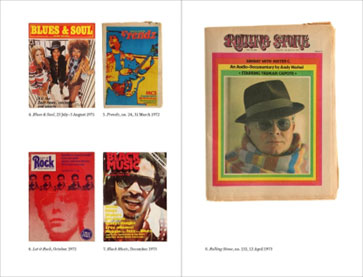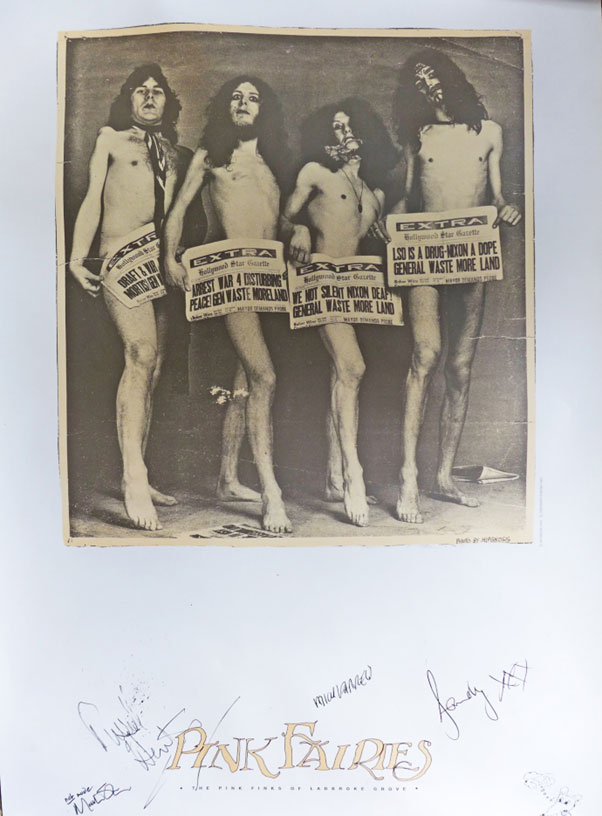Paul Gorman, Thames and Hudson ISBN 978-0-500-29746-9
384 pps including lots of music media images
A celebratory review by Alan Dearling

A really rather wonderful book, recently published in paperback. I’ve worked in and around publishing for much of my own life and have had many friends who’ve earned a crust and more in the rock ‘n’ roll media. This book is a delightfully irreverent, salacious, gossipy account of the music magazines, and their writers and photographers in the UK, the USA, with little excursions over to Australia, and ‘trips’ into the counter-culture. ‘Melody Maker’ kicked off the genre in 1926. The ups, ‘the up, up and aways’ since then, have been followed by the Music Press balloon bursting in the wake of on-line social media. It all seems to be retro now, looking back over the proverbial shoulder at the ‘golden ages’ of rock-writings. The context – the ‘life and times’ – the explosion of youth culture, fashions and the markets it created, are as much cultural importance as the actual magazines, whether they were ‘Rolling Stone’, ‘Friends’, ‘Creem’, ‘Bomp’, ‘ZigZag’, ‘Disc and Music Echo’, ‘Sounds’, ‘MM’, ‘The Wire’ or the ‘New Musical Express’. How can we value music?
Mick Farren: “Why bother about the new ELO album on the day ‘The Godfather’ comes out?”
Paul Gorman’s book is a real page-turner…it’s a Gonzo-style roller-coaster, crammed full of delightful and frequently rude and even crude vignettes of music stars and the writers who sometimes clambered on the shoulders of the ‘stars’ and became icons in the their own rights and writings. It shines a floodlight on the Mad Max antics of many members of the music press. Much drugs, alcohol, tall stories and a curious and at times conflicting mixture of fun, serious music criticism, mayhem, snide rudeness and debauchery. Nick Kent, one of the most prominent and talented music journos sums it up:
“I wasn’t interested in temperance…I was devoured by rock ‘n’ roll…I wasn’t a great writer. I was more a work-in-progress. But I had the energy, passion and drive to go out and find that fucking story.”
Likewise, Charles Shaar Murray is quoted saying: “We despised the record industry…gave not two hoots for the sensitivities of our publisher or the profits of our shareholders, and relentlessly satirised favourite musicians like (Brian) Ferry, whose ludicrous clothes and fragile ego inspired us to seek endless ways to mis-spell his name; the most memorable including not just Byron Ferrari but also Brian Fury, Biryani Ferret, Brown Furry and Brawn Fairy!” Adding, “I miss that spirit of collective transgression.”
This book eloquently evokes the loving mis-deeds of many writers. Creators with pens, typewriters, reporters’ note-pads and cameras, who kept alive the spirit and energy, of school and college magazines and newspapers. Perhaps bizarrely, it was the listings magazine, ‘Time Out’, that took over the hard graft of the gig listings (and some of the paid adverts) from ‘IT’ and made a significant buck or three. Tony Elliott and the young Bob Harris, later to host ‘The Old Grey Whistle Test’, were the two entrepreneurs who set up the new London gig guide!
There is much in the book to inform, amuse and illuminate a reader’s knowledge and understanding of the music industry in all its myriad parts. Who were the ‘players’, the shakers, the movers and groovers? A ‘for instance’: I hadn’t realised that Chrissie Hynde, originally from the USA, worked as a relatively young writer on the NME in 1974, when she was without a work UK visa, so used ‘Hynd’ as her pseudonym. Like Farren and Lenny Kaye, she was a musician first and a writer, second. ‘Totally Wired’ also provides a glimpse of the various eras of the different ‘Old School’ staff writers from Jack Hutton to Jann Wenner, Maurice Kinn through to Caroline Coon, Lester Bangs, Julie Burchill, Alan Lewis, Viv Goldman and beyond. Times and tastes change and younger audiences were catered for by newer titles such as ‘Smash Hits’ and ‘The Face’. In a post-punk era, the musical audiences and genres splintered even further. New Wave, glam, two-tone, shoe-gaze, Britpop, dub, hip-hop, rap and especially disco and dance, and then EDM, further fractured the potential readership(s). Some writers, like Allan Jones and Caitlin Moran are still active. David Hepworth and Mark Ellen were very prominent in the new wave of the music media. ‘Mojo’ and ‘Uncut’ are among the glossy monthly music magazines still published in the UK. But most articles are reminders of previous eras, especially the sixties’ pop and psychedelia and the seventies’ punk era.
In ‘Totally Wired’, sexism and feminism and the impacts of Rock against Racism and Oi! bands are discussed, but thankfully without too much political correctness. Caroline Boucher from ‘Disc’ reminisces:
“If Mick Jagger wanted to be interviewed with his head on my lap, which has happened quite often, go for it. It was fun!”
The print music press in my view has largely become moribund. It’s certainly less subversive, a minor reflection of its old glory days. Paul Gorman’s ‘Epilogue’ ends with a quote from David Hepworth, founder of ‘Q’, from when it closed in 2020:

“You’re going to miss the music press…Why? Because it did one thing that you failed to value. Through its lens it made your acts seem exciting and larger than life, even when they weren’t.”
I miss the days, nights and early hours of mornings in the company of some of my friends and colleagues, music writers and editors such as Dave Robins, Graham Keen, Mick Farren, and Carol Clerk, from ‘International Times’, ‘Melody Maker’, and more. Fun, chatting, frolics – before, during and after gigs. I’m still active with on-line zines: ‘Gonzo’ and ‘International Times’. It still seems worthwhile. A small creative contribution to the music business and the music press. The ‘blurb’ on the book back cover suggests it is the “…definitive account of the music press on both sides of the Atlantic.” Actually, and thankfully, there’s still plenty of naughty tales to be shared and published. In the meantime, Paul Gorman’s contribution in ‘Totally Wired’ offers plenty of musical, magical, angel dust! Well worth getting hold of your own copy.
Not from Paul’s book, but here is the signed Pink Fairies’ poster that Mick Farren gave me some years ago at a gig under the fabled West Way in London. In some ways it sums up the symbiotic relationship between the more edgy excesses of leftfield music and the music press.

